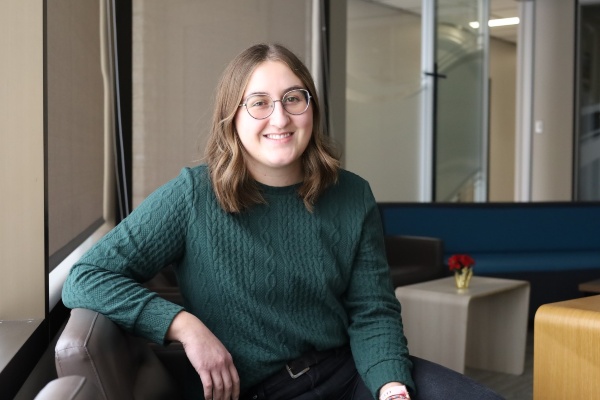
Innovation, experimentation, and looking at the big picture
Erin Dueck’s path to work in environmental science wasn’t conventional - and that’s for the better.
By Matt Olson for JSGSErin Dueck describes herself as a “big picture” kind of thinker.
For Dueck, who earned a Bachelor of Science with a Certificate in Global Studies, that meant looking ahead to a career in something like environmental sciences. Diving into the Master of Public Policy (MPP) program at the Johnson Shoyama Graduate School of Public Policy (JSGS) was definitely not on her radar.
“I didn’t even know about JSGS or public policy in my undergrad,” Dueck said. “It wasn’t until I started looking into different Master’s programs that I found this.”
Despite being an unexpected path in her academic career, Dueck said her experiences so far have only reinforced that her choice to come to JSGS was the right one.
“The faculty are so supportive,” she said. “There’s a strong sense of, they really want to do whatever it takes to make sure we become our best when we leave.”
“We are a sustainable school — the interdisciplinary nature of the school introduces students to people of other backgrounds and experiences that can complement our own.”
Dueck’s focus throughout her undergraduate study was the environment. An avid lover of the outdoors, some kind of career in environmental science seemed like the obvious choice.
And she had the opportunity, working in the field for a mining company doing some sampling in the field.
But as Dueck puts it, environmental science is a broad discipline — and the field work she was doing didn’t feel like the right way for her to address her passion for it.
“I wanted to do something that had more of an impact, that took it to the next level,” she said.
Dueck admitted to feeling somewhat “hopeless” as she looked for her next step in higher learning. Professors from her science-focused classes would send her suggestions for programs and plan meetings, but nothing was fitting what Dueck wanted to pursue.
It was her mother who came across the programs at recommended JSGS and recommended that Dueck look into it. Soon enough, Dueck was reaching out to faculty members at the school and perusing the website. It didn’t take long for the school to stand out. No one in Dueck’s close circle works in the public policy sector, and the uniqueness of the field stood out to her.
“There were three research areas JSGS lists on their website,” she said. “The one I felt like I fit into was ‘Innovation, Science and Technology Policy.’”
“Looking through the things the faculty were doing, seeing a strong place for environmental policy, I thought, I’ll give it a shot.”
The program Dueck entered — the Master of Public Policy — is a thesis-based program supplemented by coursework.
It took Dueck a bit of time to decide on the focus of her thesis, but she said the initial courses gave her an overview of public policy both theoretically and applicatively.
Getting to work with other people in her cohort on projects ranging from class presentations to multi-part reports to behavioural science surveys and qualitative analysis, Dueck found a new perspective on what the school was all about — and how she could focus her research in it.
“Policy isn’t just about politics. It’s more about decision-making. Policy affects everyone, whether they recognize it or not,” she said.
Dueck’s thesis research revolves around the idea of the “circular economy” — an economic framework where products are meant to last much longer, businesses are constantly recycling older products to create the new ones, and resources are freely shared to maintain the refurbishing and recycling of products and materials.
Specifically, Dueck is examining policy at the provincial level in Canada regarding how “waste management” evolved into “waste reduction,” and how further policy decisions can take steps towards the idea of a circular economy.
It’s not an area where there has been much research focused in Canada, Dueck said — so for her, it feels like a chance to break new ground.
“There’s not a ton on circular economy policies … that’s exciting,” she said.
While it’s taken some effort from Dueck to get to this point in her work, studying at JSGS felt like the right fit from the beginning.
Dueck credited her experiences in her early courses, liaising with government representatives — and a knowledgeable team of instructors — for setting her up to succeed in a new field.
“The faculty are really supportive,” she said. “There’s a strong sense of, they really want to do whatever it takes to make sure we become our best when we leave.”
Looking ahead to her post-JSGS life, Dueck said she enjoyed getting the chance to delve more deeply into research on her new and exciting thesis topic.
And if she can’t decide whether environmental studies or public policy is going to be the next step, maybe living in the spaces between is a good way to use her new knowledge and skills.
“There’s people who work in industry, and they know that very well, and there’s people who have cultural or traditional knowledge, and they know that very well, as well as other groups like educators and advocates and many other groups made up of knowledgeable individuals… you can tell, talking to all these people, they’re all very passionate about what they do,” Dueck said.
“But obviously, there’s some disconnect unless you can bring these people together to talk. Being involved in policy, we get the middle — a little bit of everything … There’s a place for anybody to take that middle ground, depending on what you’re interested in.”

